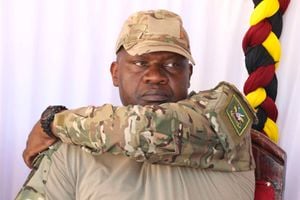
Longton Jamil with his younger brother Nadhim Longton who were abducted in Kitengela and released after 32 days in captivity.
The Longton brothers, Jamil and Nadhim, were never supposed to tell their story. They had been warned: If you talk to the media, you will be killed.
But on December 19, 2024, the Cabinet Secretary, Musalia Mudavadi, made a statement that broke their silence.
He claimed: "Social media has been used to perpetuate a narrative that certain lawful arrests were abductions... Some of those allegedly abducted have been safely reunited with their families, for example, the two Kitengela brothers and activists."
This wasn't just a matter of setting the record straight. Mr Mudavadi's statement to the brothers was an admission of the government's role in their ordeal - despite previous official denials.
Mr Mudavadi's words tied their suffering to the very hands that denied it.
"The government lied to Kenyans," said Jamil. His voice cracked with anger. "The statements were false."
Their nightmare began long before they were taken. Twelve days before their abduction, whispers from a security meeting reached them. The message was chilling: Don't take part in the demonstrations or you won't go home.
Then the brothers disappeared without a trace. For 32 harrowing days they endured unimaginable torture, they said.
When their captors finally released them, it wasn't freedom - it was abandonment. They were blindfolded and dumped in Gachie - a leafy suburb on the outskirts of the city and several kilometres from the gates of the compound where they had been taken.
"Don't open your eyes," the men warned. "Don't touch the blindfold until we're gone."
Jamil had been a healthy man, weighing 74 kilos. By the time he was released, he had lost 16 kilos. He spoke softly of leaving behind his pregnant wife, who was seven months pregnant when he was taken.
"I kept wondering if I'd ever see her again," he said.
The brothers were thrown into a pitch-black room, stripped naked and handcuffed to the floor. Food came once a day, but the torture was constant.
“Once you’re there, you lose hope,” Jamil said, his eyes clouding.
“You stop believing you’ll ever leave. Your body becomes numb.”
Time blurred in the darkness. Daylight was marked only by the faint chirping of birds. Night brought the distant barking of dogs.
One month and two days later, the brothers are free. But far from cured.
"I'm still trying to recover," says Jamil. "Financially, health-wise, emotionally... I've lost so much."
Before the abduction, Jamil was a thriving businessman. Now he's struggling to rebuild. His customers no longer trust him.
"My brother and I have been painted as hardened criminals," he said, tears threatening to roll down his cheeks. "Only God knows we're innocent."
Nadhim echoed his brother's pain.
"The government has destroyed my life," he said, his voice heavy with grief. "We pretend to be happy. But inside we're broken."
The fear remains, shaping every corner of his life. The friends who once stood by him are gone. When he returned to the garage where he worked as a mechanic, his tools were missing.
"Maybe someone thought I wouldn't come back," he said, his voice barely above a whisper.
Even now, memories of their captors haunt them. The men, who the brothers believe were policemen, demanded answers: Who's financing you? Who's behind you? To which they had none, Nadhim said: "I was just taking part as a Kenyan who felt the government was not listening.
Nadhim remembers the helplessness, the crushing sense of finality in the hands of his captors.
"Nilijua maisha yangu imefika kikomo," he says quietly. "I thought my life was over."
Even today there are things he cannot bring himself to do. The shadows of those 32 days follow him, a constant reminder of how close he came to losing everything.
Jamil and Nadhim Longton are free, but their lives will never be the same. Speaking out was their act of defiance - a way of reclaiming their voices. But healing remains a distant dream, clouded by fear, loss and unanswered questions.











